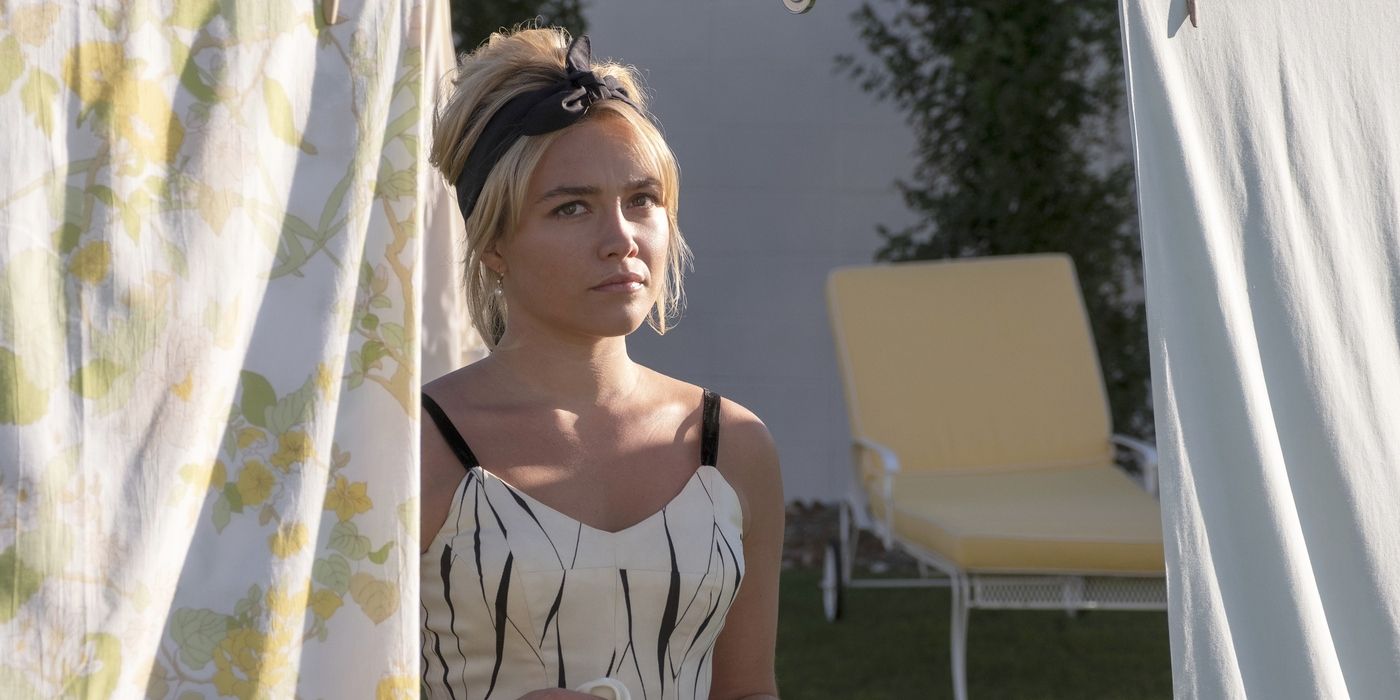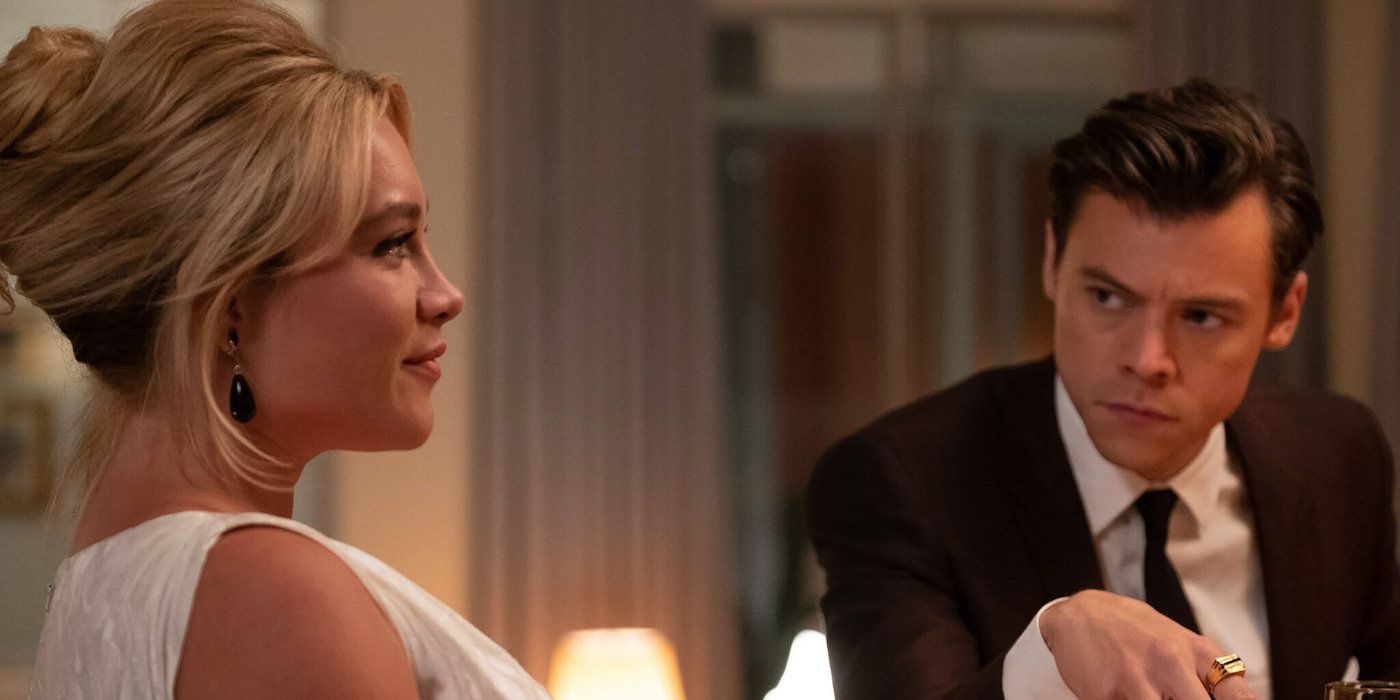Editor's Note: The following contains spoilers for Don't Worry Darling.
Welcome to Victory, an idyllic landscape of sunshine, palm trees, and systemic oppression. In director Olivia Wilde’s much-anticipated thriller Don’t Worry Darling, the citizens of this 1950s-esque mystery town exist in beautiful, twisted harmony. The men leave every day to do top-secret but vitally important work, and the women do quite literally everything else. The gender roles in this community are concrete. The wives of Victory spend their days cleaning, shopping, and most importantly, not asking questions, their seemingly perfect lifestyle held together by an ironclad agreement that they keep their mouths shut. The husbands come home every night to their doting wives, ready to have hot kitchen-table sex while a roast cooks in the oven.
Throughout the movie, we can see how even though the women work hard all day scrubbing bathtubs and vacuuming rugs, they are always second to their husbands and expected to be grateful for the opportunity to support their men. While Alice Chambers (Florence Pugh) is introduced as a cheerful young woman who gladly plays the part of a doting housewife to her charming husband Jack (Harry Styles), she later begins to see through the cracks of the supposed utopia.
To preface, femininity is obviously not a one-size-fits-all model and means something different to everyone. There are women who choose to have careers outside the home, and women who choose to focus their energy on other things. As we all know, the important thing is that an individual has the right to choose how they spend their time, regardless of what others may think. However, within the shimmering walls of The Victory Project, the only way to be a woman is through cleaning, cooking, dancing, and submitting to a man. The women have little sense of identity apart from that which revolves around being a wife or a mother. As this world unravels around Alice, it is evident that in this fragile, manmade society, things that are often linked to femininity are twisted and distorted, so the women are being punished whether or not they buy into the fantasy.
Femininity As Oppression
First off and fitting in with the theme of conformity, every woman in Victory is apparently enrolled in the same dance class. In the first scene of the movie, the wives balance cups on their heads and dance for their husbands, who smoke cigarettes and admire the women with hungry eyes. At first glance, dance seems to be a fun activity, but this illusion is shattered once we enter the dance studio. While pretty much every other place in the town is adorned in bright colors and bathed in warm light, the ballet studio is cold and gray. Most of the women wear black leotards in contrast to their colorful dresses, and their wide smiles are replaced with looks of solemn concentration. While dance is normally a way to be creative and express oneself, in Don’t Worry Darling it is used solely as a form of control. It enforces ideas of restraint and uniformity, both of which are integral to maintaining Victory’s status quo. Later, when Alice has a vision of her friend Margaret (KiKi Layne) trapped behind the mirror in the dance studio and smashing her head against the glass, we see a literal representation of how this space is not freeing but restrictive.
This idea of femininity being used to confine is seen again in the movie when Alice is cleaning her windows, and the wall comes up behind her, crushing her against the glass. In this scene, the house — and the maintenance of it — becomes a literal object of oppression, effectively suffocating her even as she tries to fulfill her role and clean it. Furthermore, later in the movie when Alice sees Margaret attempt suicide by slitting her throat and then falling off the roof, Jack and Dr. Collins (Timothy Simons) tell Alice that Margaret actually fell while cleaning her windows. By reframing the story this way, not only did Margaret get hurt while doing the work designated for the women, she was blamed for being injured while doing so. When Alice questions this and becomes obsessed with finding out the truth behind The Victory Project, she’s not just labeled as irrational, she’s hysterical. Her madness and her femininity are intrinsically linked.
A Misogynistic Reality
When we learn near the end of the film that The Victory Project is in fact a simulated reality created by enthusiastic founder Frank (Chris Pine) where men trap women within their own minds while they tend to their bodies, this corrupted view of womanhood finally makes sense. In this perverted paradise, women are punished for not desiring the things that men deem they should, and forced into a fake world where even as idealized versions of themselves, they’re still not enough. Victory operates under the assumption that the women won’t care enough —or will lack the capacity— to question their existence, with its creators not even bothering to give the women diverse backstories or sets of circumstances. All the women met their husbands the same way and came from the same set of cities, and the men behind it never considered that the women might figure out that there was something sinister at play.
During the deliciously tense dinner party scene where these discrepancies are revealed, Alice’s perpetually pregnant friend Peg (Kate Berlant) hopes aloud that her unborn child will be a boy, because “girls are hard,” further cementing that the women are meant to see themselves as inferior because that’s how their husbands see them. Jack and the rest of the men manipulate and torture their partners (both physically and emotionally) under the deranged guise that they’re doing them a favor because they can’t accept that the women’s identities and desires hold just as much value as their own. Even as Alice's best friend Bunny (Olivia Wilde) knowingly participates in Victory so that she can live with simulations of her children who died in the real world, she lives in constant fear knowing that any disruption in the system could cost her the loss of her kids a second time, and she is under further pressure to comply.
For all these reasons, Don’t Worry Darling reminds us that when women only exist through the eyes of misogynistic men, they are reduced to nothing more than the sum of their parts. Even as this fabricated society forces women to assume a certain feminine ideal, this idea of femininity is degraded anyway so that even if they comply with the rules forced upon them, the women of Victory will never win.




